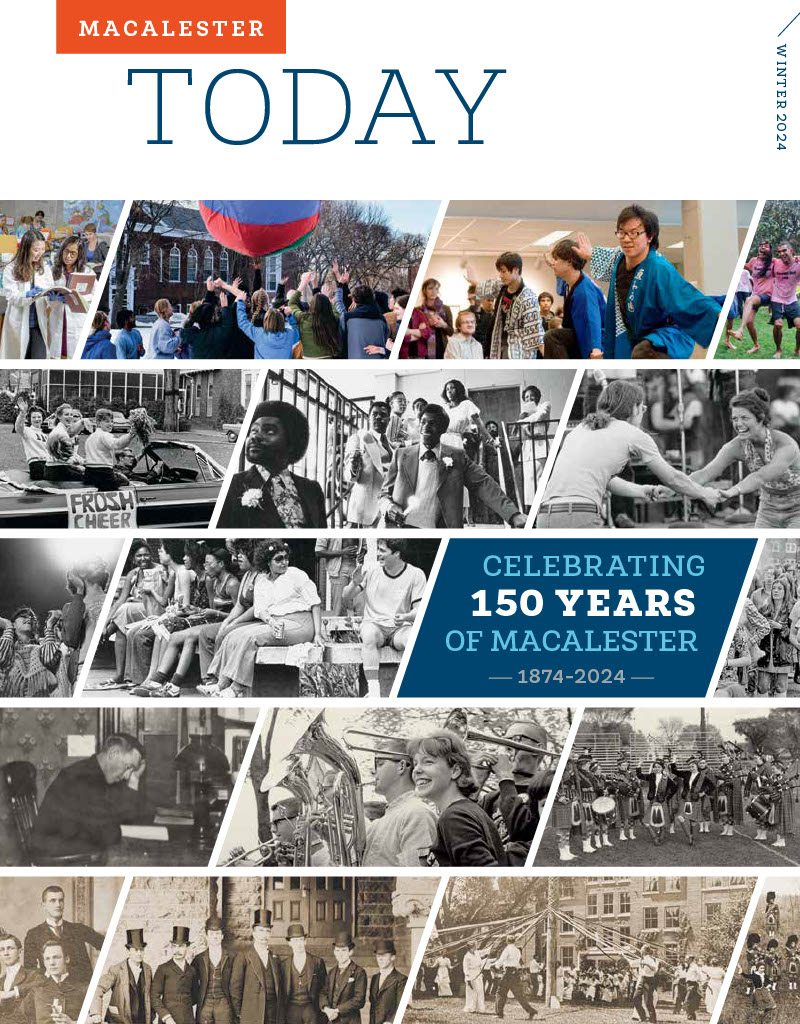
By Laura Billings Coleman / Photo by Natalie Champa Jennings
On a Saturday afternoon at Minneapolis’s Franklin Library, Chris Griffith reports for work in his standard attire: knee-high leather boots, a tight-fitting aviator helmet, a giant papier-mâché turtle shell on his back, and a ukulele strapped to his chest. Nearby, Shari Aronson, his wife and creative partner, has made her entrance in a fluffy bunny costume and Amelia Earhart goggles, shaking her tail and twinkling her eyes merrily.
During the next forty-five minutes, in front of a small crowd of kids and librarians, the pair will produce props and puppets of all sizes, sing songs, bang drums, and tell terrible jokes—all the sort of high-spirited silliness that’s become their calling card as creative directors of Z Puppets Rosenschnoz, the theater company they founded twenty-five years ago. But with this performance of “Say it! Sing it! Play it! In Cherokee” they’re also aiming for something more serious—leaving audiences at school assemblies and library programs around the country with a few new words in Cherokee, an endangered Indigenous language that experts believe is now spoken by fewer than 2,000 people.
One of 3,000 world languages in danger of disappearing by the end of the century, Cherokee is also one of the most difficult to learn, with a unique written syllabary (a table of syllables) of eighty-five symbols representing Cherokee’s distinct sounds. For Griffith, a member of the Cherokee Nation, the idea of revitalizing Indigenous languages through performance and puppetry had always inspired him, “but I thought I had to wait until I became more proficient at the language myself. Then I heard a Cherokee elder explain that we’re losing native speakers much faster than we’re replacing them, and that it’s all hands on deck,” he says. “Whatever step we can take right now is a step in the right direction.”
Leaning in to learn more about his native roots has been a lifelong pursuit for Griffith, who grew up outside of Philadelphia, but made frequent trips to see extended family in Tahlequah, Oklahoma, the capital of two federally recognized Cherokee tribes. Within his first few weeks at Macalester, he became an active member of PIPE (Proud Indigenous Peoples for Education), working with other students to organize three annual Pow Wows that attracted thousands of Native dancers, drummers, and artists to campus. “Visiting other campuses, I could feel there was a kind of pressure to conform, but at Macalester there was very little pressure to be anything besides who you were,” he says.
That freedom allowed Griffith to pursue myriad interests, from his major in cultural anthropology, to improvisational theater, to juggling flaming torches (a skill he continues to highlight on his LinkedIn profile). “Something about the immediacy of street performance has always appealed to me. There’s so much unpredictability, but when it works, it works so well,” he says.
A Mac class that introduced him to the power of masks inspired a senior-year internship at Minneapolis’s In the Heart of the Beast Puppet and Mask Theatre, where he continued to work after graduation. “Working with masks and puppetry requires skills in visual arts, performing arts, and music—you’re kind of drawn in some ways to become a jack-of-all-trades.” Griffith went on to become a cofounder and artistic director of Galumph, an interactive theater company that he describes as “possibly ahead of its time,” for persuading self-conscious Midwesterners to participate in theater through the magic of puppetry.
“People will say things to a puppet that they would never say to another person, and they’ll hear things from a puppet that they could never hear from a person,” says Griffith, who has earned recognition for his work from groups including the National Endowment for the Arts and the Jim Henson Foundation. “There’s something intangible about a puppet that speaks to an unconscious part of our minds that’s really compelling. I still don’t understand it, even after working with puppets for thirty years.”
A direct descendant of John Ross, the legendary Cherokee chief made to lead his tribe during “The Trail of Tears,” a more than 1,200-mile forced removal from Georgia to Oklahoma, Griffith says his Indigenous identity often felt similarly removed from the culture. “Presenting as someone with very light skin and blue eyes, nobody would assume I’m Cherokee unless I tell them. I’ve never felt fully immersed in either world,” he says. But as online resources and virtual learning communities began making Cherokee language learning more accessible, Griffith says, his shift in identity has been profound. “More than just a community of learning, it’s given me a sense of belonging. The language is a door that’s been unlocked for me.”
While Z Puppets Rosenschnoz continues to bring their Cherokee language programs on tour, they’ve also launched Star Turtle, a YouTube series with a Sesame Street-meets-science fiction fantasy vibe aimed at making Indigenous language learning even more engaging. Featuring the characters of Dagsi Turtle and Jisdu Wabbit, each episode follows the pair on a race through space and time to safeguard Grandmother Turtle, a metaphor for Indigenous language and culture. “Putting turtle and rabbit on a spaceship has been so much fun,” says Griffith. “There’s so much information out there about the Indigenous past, it’s exciting to imagine and contribute to an Indigenous future.”
St. Paul writer Laura Billings Coleman is a frequent contributor to Macalester Today.
February 5 2024
Back to top





